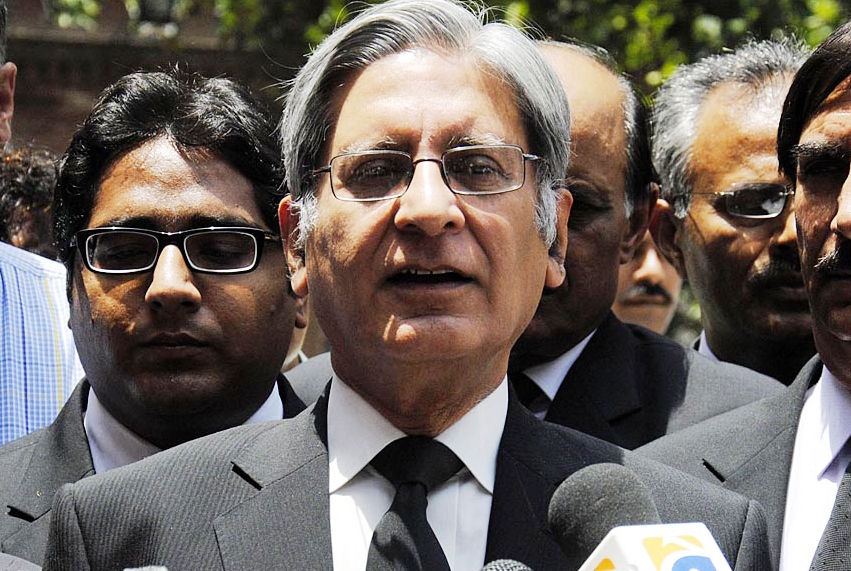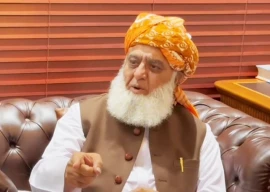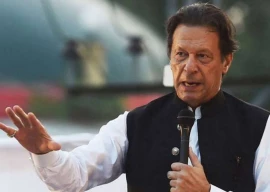
The method of appointment of judges of the superior judiciary was the focal point of the Senate session on Monday, with the Leader of the Opposition Chaudhry Aitzaz Ahsan strongly criticising the procedure as one that encouraged nepotism.
“It’s judges begetting judges once again,” Ahsan said during the Senate session, adding that such a system allowed judges to appoint their friends and relatives in the higher judiciary.
The debate was started by Senator Farhatullah Babar when he brought the procedure for the appointment of judges under discussion in the upper house.

Senator Ahsan pointed out that the method laid down on the 18th Amendment of the Constitution was appropriate, but had been rejected by the superior judiciary.
“Constitutionally, the parliament is sovereign and superior and it should play its due role. If necessary, the parliament should reject the current system and put in place a new one after debate and discussion,” said the senator.
Pakistan Peoples Party’s legal wizard and the vanguard of 2007 movement for restoration of an independent judiciary cited the 1996 Al-Jihad Trust case decision, where he said the then top judiciary had made it binding on the government to consider recommendations of judges’ on the appointment of new judges.
“After this even those who had never paid income tax were appointed by the judiciary as judges,” Ahsan alleged.
The senator said all those judges whose names had been rejected by the parliamentary committee were later appointed through writ petitions, and that the committee was just meant to be a ‘rubber stamp’.
He also said that he had voluntarily quit the committee’s membership.
Quoting the British-era system of appointment of judges, the Senate’s Opposition leader said it was the best system as the government was only required to consult the judiciary.
“It was not binding on the government to consider the advice of the judiciary in the final decision,” he said.
“The problem began after the judiciary rendered ‘consultation’ as ‘consensus-oriented’,” Ahsan stated, adding that the system provided by the 18th Amendment was struck down by the judiciary.
Earlier, PPP Senator Farhatullah Babar had said that the manner of appointment in judiciary was central to its independence.
“Failure will result in a judiciary of the judges, for the judges, by the judges.”
“Glory of judiciary lies in diversity of legal opinions and not in a regimented command structure,” Babar said adding that it could not be left at the mercy of one individual or institution.
PSM’s privatisation opposed
The Opposition in the Senate also staged a combined token walkout prompted by PPP’s Senator Raza Rabbani over the government’s proposal to privatise Pakistan Steel Mills (PSM). Criticising the government for planning to privatise 68 government departments including PSM, Senator Rabbani said his party would oppose the move.
“The privatisation of the PSM would render hundreds of employees jobless.” he remarked.
However, Muttahida Qaumi Movement (MQM) Senator Babar Ghauri supported the government’s decision.
“The sick units should be privatised but not at the cost of workers,” said Ghauri.
Meanwhile, Leader of the House Raja Zafarul Haq rejected the notion that PSM was being privatised on International Monetary Fund (IMF) instructions.
“The PSM has been operating in deficit over the years. With the present state of the country’s economy, its recovery is not possible without privatising it,” Haq said.
Published in The Express Tribune, October 29th, 2013.
COMMENTS (2)
Comments are moderated and generally will be posted if they are on-topic and not abusive.
For more information, please see our Comments FAQ
1724760612-0/Untitled-design-(12)1724760612-0-405x300.webp)
















@Anjum Hiader: That is how it is done in a Democracy. Judges are unelected, virtually unaccountable and practically irremovable. I would not like a tyranny of judges any more than tyranny of generals. Let us put some value on Freedom, politicians are our representatives whom we are free to elect, criticise, prosecute or remove at election time. They reflect our will.
So they want a judiciary for the politicians selected by the politicians.